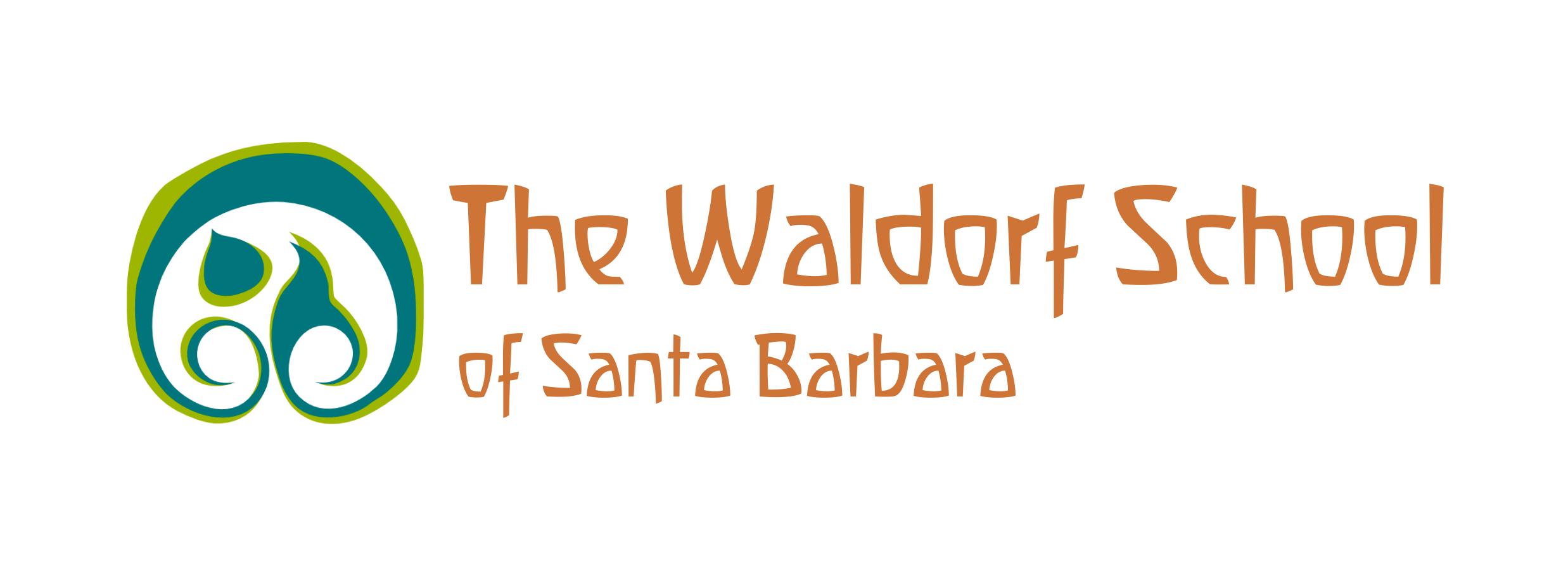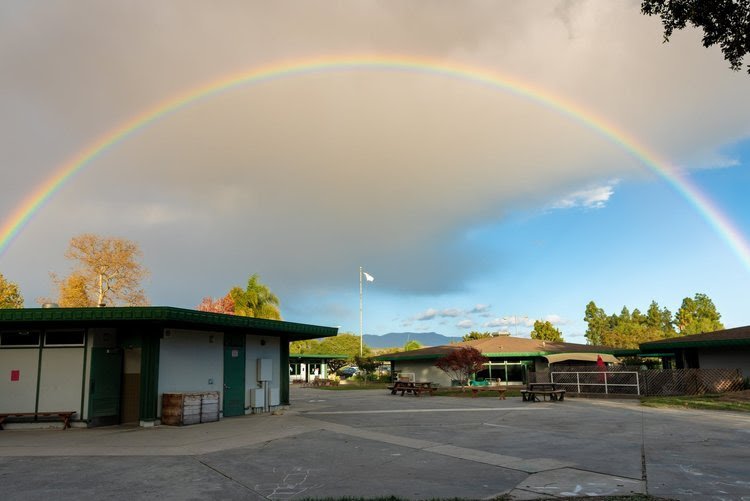The Lantern-Lit Path
Dear Members of The Waldorf School of Santa Barbara Community,
Viktor Shklovsky said that “art exists that one may recover the sensation of life; it exists to make one feel things, to make the stone stony.” One might say the same about ritual. Here at The Waldorf School of Santa Barbara ritual helps us recover the sensation of life. Morning Glory, the youngest Early Childhood class at WSSB, recently held a yearly ritual walk. Here’s the account of that walk from Ms. Tina:
“We had our lantern walk last Friday. 13 of our 14 families attended. Brother Wind and Sister Rain both made a brief visit right before the walk. Together they created the most beautiful rainbow that spanned the entrance of our school. Families were greeted by this sight.
We gathered as a class in the Early Childhood yard, enjoying snacks prepared by each family. The parents were able to connect with other parents while the children played together. As the sun set the children joined me in the classroom to get the lanterns ready. Then together with lanterns in hand we began our walk.
Beautiful lanterns lighted the path through our beautiful school garden to the amphitheater. When we reached the amphitheater and gathered in a circle, a big full harvest moon was rising. We sang songs about the importance of shining our inner light as we experience the darkness of these shorter days.
After the singing, families left in ‘quiet’ with the children guiding their parents back to the car with their lanterns. It was truly a magical evening. Here are a few comments about the Lantern Walk from WSSB parents:
‘Thank you for creating such an intentional space for not only our children but us as parents.’
‘The rain, rainbow, full moon and the glow of the lanterns created such a magical evening for everyone!’
‘Being together as class, getting to watch my child play with children he talks about made me so happy. He was so proud to walk with his lantern, lighting the way.’”
Here are two messages from the FEC committee:
1).
Dear Parents,
As we prepare for our beloved Winter Faire, I invite you to join in the spirit of giving by donating gifts to our cherished Angel Room. This magical space, where children can select and wrap presents for their loved ones, relies on the generosity of our community to create an enchanting experience.
Any donation is warmly welcomed, including new or gently used items from your home. We welcome books, candles, games, puzzles, jewelry, home decor, mugs, decorative plates, crocheted or knitted items, hats, scarves, blankets, holiday ornaments, and more.
Your contributions not only support our event but also nurture the joy of giving and receiving that’s part of our Waldorf spirit. Thank you for your continued support and participation in making this Winter Faire unforgettable.
A donation bin is located in the office on the front bench.
Warm regards,
The FEC Team
2).
Dear Parents,
A friendly reminder that today, Friday November 22nd, is the last day to purchase a Christmas Tree.
Anthony’s local tree farm is donating 25% of every tree purchased to our school.
Please see link below for more details and to purchase your family tree and/or angel donation tree.
https://www.zeffy.com/en-US/ticketing/christmas-tree-purchase
Thank you for supporting our school in this way!
Warm regards,
The FEC Team
Roughly a thousand items were brought in for our Thanksgiving food drive. Thank you WSSB. And thank you to the Eighth Grade for overseeing such generosity.
Important Dates:
November 25-29: Thanksgiving Break
December 6: Advent Spiral (details coming soon)
December 7: Winter Faire from 12 to 5 p.m.
December 9: Strings Assembly at 8:45 a.m.
December 13: Faculty Offering at 11:30 a.m. Dismissal at 12:45 p.m.
December 16-January 3: Winter Break
With gratitude,
The WSSB Admin Team
PS There is a reason writer Kim John Payne (author of Simplicity Parenting and Being at Your Best When Your Kids Are at Their Worst and other books) is beloved in the Waldorf world. His insights into education, parenting, and the human condition are brilliant. We share below a handful of profound passages. Please take your time with them.
“I have heard a definition of addiction as being ‘an increasing and compulsive tendency to avoid pain, boredom, silence, inner development, and moral responsibility by displacing it with outer stimulation.’”
“What we as parents want above all is to be at our most loving when our kids are at their most vulnerable.”
“We need to guard against harmony-addiction, in which we strive for rainbow-colored, aura-balancing family experiences daily. Where joy is good and struggle is seen as bad. Everyone knows than an idealized picture of family life where everyone is happy and contented all the time is a mirage, and yet the desire to achieve it lies deep within us. We need to remind ourselves that we do not become happy with how things are going in our family by rejecting the parts of ourselves that we don’t like…”
“When we claim we were raised in a family in which ‘we just told the brutal truth,’ we are in the throes of anger justification. There is a world of difference between speaking the brutal truth and speaking the truth brutally.”
“We all know it’s a mistake to personalize a child’s bad behavior. But in the heat of the moment, we often make difficult interactions with our children all about us. A mother whose nine-year-old daughter was engaging in lots of outbursts and arguments confided, ‘I get so hurt by the things she says and the accusations she makes!’…The most important thing to understand is that our troubles begin when we take things personally.”
“When children and teens are their most angry selves, they are also at their most vulnerable. In such moments they are hypersensitive to any shift in the emotional current flowing between them and their parents. If we harden our facial expression, narrow our eyes, drop our forehead, or draw ourselves up, growing perceptibly larger, harder, and sharper, our children will retreat…However, if they pick up on an almost imperceptible softening of the eyes, relaxing of the shoulders, or unclenching of the hands, their nervous system can stand down. Acknowledging and understanding that our children are disoriented rather than disobedient when they act out helps us embrace a more accepting attitude. Our response can then tilt toward kindness and understanding at the very moment when our child needs our acceptance the most.”




